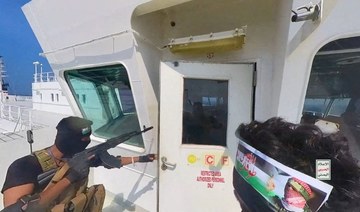AL-MUKALLA: The leader of Yemen’s Houthi militia said on Thursday his forces had launched 403 drones and missiles against 61 ships in the Red Sea, Bab Al-Mandab Strait and the Gulf of Aden since the beginning of their offensive, boasting that retaliatory strikes by US and UK military forces had strengthened his group.
In a televised speech, Abdul Malik Al-Houthi said 19 missiles and drones against seven ships had been launched since Friday and that modern weaponry was employed that went undetected by the US and UK navies.
“In yesterday’s strike there was amazement at the precision of the attack and the power of damage,” he said, referring to an assault on Wednesday.
A missile fired by the Houthis struck the M/V True Confidence, a Barbados-flagged, Liberian-owned bulk carrier, in the Gulf of Aden. Three sailors were killed and four injured, three of whom remain in a critical condition according to a statement by the US Central Command on Thursday. Significant damage was also caused to the ship.
This comes as Houthi media reports that the US and UK conducted two airstrikes on Ras Isa in the western Hodeidah province on Thursday, less than a day after another round of US and UK airstrikes hit the city’s airport.
The US military is said to have carried out preemptive attacks on ballistic missiles, drones, and remotely operated and explosive-laden boats which the Houthis planned to fire at international and commercial ships in the Red Sea from areas under their control in Yemen.
At the same time, the Houthis said they had attacked the M/V True Confidence and other ships after its warnings against entering the Red Sea were disregarded. The group also accused the US of pressuring ships to challenge its blockade against vessels bound for Israel.
In a post on X, Mohammed Abdulsalam, a chief negotiator for the Houthis, said: “The Yemeni military does not strike any ship until it is instructed not to cross, and some comply and depart, while others that refuse are attacked. We hold America responsible for the repercussions of any events in the Red Sea.”
The head of the Houthi Supreme Revolutionary Committee, Mohammed Ali Al-Houthi, said the group did not intend to kill civilian sailors on the M/V True Confidence. He added that if the US shared the cost, the Houthis would compensate the families of those killed and injured. “We feel that America should compensate these victims for a purposeful act. We are also willing to compensate them for an unintended act,” Mohammed Al-Houthi wrote on X.
Since November, the Houthis have seized one commercial ship and launched hundreds of drones, ballistic missiles and drone boats against commercial and navy vessels in the Red Sea, Bab Al-Mandab and the Gulf of Aden.
The Houthis say their actions are in support of the Palestinian people and to push Israel to allow food, water and medicine into the besieged Gaza Strip.
Meanwhile, the Intergovernmental Authority on Development, a group of eight East African countries based in Djibouti, expressed concern on Thursday about an impending environmental disaster on the M/V Rubymar, which sank after being struck by a Houthi missile in February. The group said if the cargo of 21,000 tonnes of ammonium phosphate fertilizer and 200 tonnes of oil leaked into the sea, it would take more than 30 years to clean up.
A statement by the group said: “IGAD calls upon all the stakeholders to invest in peaceful options to address the looming environmental disaster in the Red Sea and Gulf of Aden. The attacks on the ship must cease forthwith.”



























